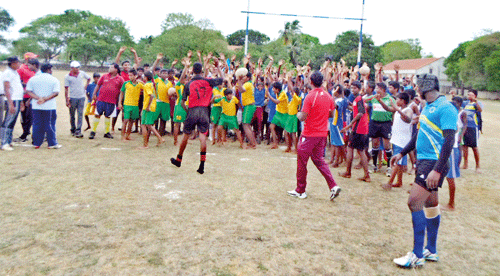Coaching coaches and how they fit the bill
View(s):
Nurturing the Rugby unknowns is mostly done by the unknowns - File pic
Do coaches face the same merry-go-round selection process that players do? They are subject to the same scrutiny of form and talent to reach the top. Once there, do they get to peck at the national order? When a coach transits to the national scene, having been mostly in a domestic capacity, he sees a world of difference between the two. Many may find that the skills don’t match the requirement of their new assignment and that, more expanded and diverse methods need to be used.
Is it time for coaches to have a pathway? In Sri Lanka we are still in the infancy of Rugby, though we boast of a history that is over a century. In that sense, not having a pathway for coaches cannot be a part of the blame of the administrators over the years.
Many coaches have taken assignments around the world before taking root in their county at national, elite or provincial Rugby. Even Cheika and others have gone through the process. It is in this world scenario that Sri Lanka finds itself in readiness for 9 coaches to be trained in New Zealand. Why New Zealand, because the opportunity was explored by High Performance Director Inthi Marikar, according to Sri Lanka Rugby (SLR) CEO Priyantha Ekanayaka. , SLR Vice President Lasitha Gunaratne thought New Zealand has been and is virtually the best Rugby playing nation. They have a good team and a well oiled machinery.
We have to move forward and look to the future. Asian Games and beyond was the thinking of the National Institute of Sports Science Director Sajith Jayalal. He said the initiative to send coaches from Sri Lanka to New Zealand is to give exposure to hone in better skills, and is a part of the overall plan to develop coaches in many sports. He says this is a start and the Ministry will fund the programme while SLR has been entrusted with the task to select the coaches. This is still in an embryonic stage, not finalised as yet, but is in the process.
SLR CEO Priyantha Ekanayake opined that Rugby owes to Jayalal who has been a force behind the proposal. He went onto say the plan is to have a set of coaches exposed to World Rugby standards, and who will be contracted and available to SLR when their services are needed to direct development squads and the growth of the game. These coaches are to enter into a Memorandum of Understanding with the SLR. The selection, he says, was based on wide criteria such as age and where they were involved in. He cited the case of Lasintha de Costa, who was coaching Isipathana over the years, has been a major supplier of national players. Pathana, he said, has to be helped as they may not have big budgets or major financiers to back them. He also said that Amila Chathuranga, who is now with St. Joseph’s, showed he had the capacity, as he guided Science College earlier, and showed what he was capable of. The aim, he said, was to have the services of these coaches to guide more on 7s Rugby, while they will be allowed to coach a team, preferably a school team. He was of the view that the structure should be developed to have separate strains of coaches who will focus on School Rugby, while others will be involved in Club Rugby.
 Sri Lanka Women’s Rugby Captain Thanuja Weeerakkody too, will take wing as the Union moves to improve Women’s Rugby in Sri Lanka. Others taking wing include successful 7s coaches Asanga Rodrigo and Sudath Sampth, Shamly Nawaz who has done well to push Rugby at Zahira upwards. There is also Nalaka Weerakkody, the maverick on the field and one-time Sri Lanka coach and Manager Rajiv Perera. This contingent will include Dilan Soysa, a former Sri Lanka player, now working with the National Institute of Sports Science.
Sri Lanka Women’s Rugby Captain Thanuja Weeerakkody too, will take wing as the Union moves to improve Women’s Rugby in Sri Lanka. Others taking wing include successful 7s coaches Asanga Rodrigo and Sudath Sampth, Shamly Nawaz who has done well to push Rugby at Zahira upwards. There is also Nalaka Weerakkody, the maverick on the field and one-time Sri Lanka coach and Manager Rajiv Perera. This contingent will include Dilan Soysa, a former Sri Lanka player, now working with the National Institute of Sports Science.
SLR Vice President Lasitha Gunaratne was of the view that a structure has to be built and this is a good opportunity to improve the knowledge and skills of coaches. Asked about the change to the type of Rugby played in the Southern Hemisphere, he believed that New Zealand was the most successful Rugby team in the world and there is much we can learn on the ways of caching and delivery. This was a 10-day period and what is important is about the delivery, than the styles of play which the coach will adopt as required in local conditions.
So that means the Ministry of Sports is committed to Rugby. The question, however, was whether the Union was committed to governance. That is where questions are asked.
It is about the individual coaches who have been successful during the season such as Sanath Martis, who has always proved to be a coach and one who can raise his collar with a noteworthy performance. There is also the name of Mothilal Jayatileke, who took the Navy to win the 7s title, as well as Nilfer Ibrahim who has proved a point. Ekanayake was of the view they covered a wide range of criteria including being available for the development work of the Union when needed, and age being a vital criterion, as we have to look for the next set of coaches.
He also said that young coaches Sean Wijesghe and Dushanth Lewke were not available with their involvement with Clubs. He, however, went onto say this will be a start and another lot will be sent probably in a year or two. The funding will be from the Ministry of Sports and will not affect the SLR purse. Somebody asked about a competence based criteria which will be the next step, if we are to uplift those who otherwise manage Rugby.
Vimal Perera is a former Rugby
Referee, coach and Accredited Referees Evaluator IRB


